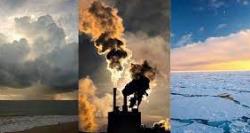Global Warming Requires Urgent and Concerted Action
|
07/19/2021 |
|
On July 16th, the U.S. Roundtable for Sustainable Poultry and Eggs issued a draft sustainability framework for chicken, turkey and egg production. Following public comment, the sustainability framework will be revised to form the basis of concerted action by the poultry industry to avert waste and conserve resources through the entire cycle of production, processing, packaging and distribution. Conservation of resources is only part of the comprehensive approach to restoring the environment that has been sadly abused by industry, governments and consumers, all bearing responsibility for degradation.

Scientists have warned of the effects of industrialization with consequential emission of greenhouse gases. The level of atmospheric carbon dioxide has steadily increased since the beginning of the industrial revolution in the mid-1880's mainly due to the use of fossil fuels including coal and petroleum products. Admittedly intensification of farming and worldwide deforestation have added to environmental degradation. Industrial-scale production has provided adequate and relatively inexpensive food for industrialized nations with only a small proportion of their populations involved in agriculture and livestock production and processing.
Industrial chemicals including refrigerants have damaged the ozone protective layer and plastics have accumulated in our oceans and on land adding to a variety of secondary impacts. The damage caused by global warming has been disproportionately borne by underdeveloped nations. Their populations have experienced desertification in Africa and the Pacific littoral, irregularity of monsoons in Southeast Asia and periodic famine and climate-related diseases Africa and Asia.
During the past year, the entire world has witnessed climatic and environmental events that have affected nations in temperate climates and have created problems for industrialized nations. In mid-July severe flooding regarded as the worst in a thousand years occurred in Western Europe. Concurrently extreme drought in the Pacific states of the U.S. has intensified. There are currently 78 active fires in Western states that have burned two million acres. Deforestation in the Southeastern Amazon has resulted in the region becoming a net generator of carbon dioxide instead of serving as a sink for this greenhouse gas. Export of grains from Argentina has been impeded by low water level on the Parana River, a direct consequence of drought in Brazil. The National Oceanic and Atmospheric Administration and the National Weather Service forecast more extreme hurricanes in the 2021 season with powerful storms fueled by higher water surface temperature. It is obvious to any reasonably informed and thinking person that climate change is a reality and will inevitably degrade our standard of living and change our way of life in less than pleasant ways.
|
 |
An international agreement on mitigating climate change named the Kyoto Protocol was signed in 1997 by eighty-four nations, extending the 1992 United Nations Framework Convention on climate change. Subsequently in 2015 a group of 196 nations agreed in Paris on goals to reduce greenhouse gas emissions and to conserve resources. The intent was to constrain the increase in global temperature to not more than 2.7F above pre-industrial levels. This would be achieved through application of financial resources and technology to reduce greenhouse gas emissions and to encourage transparency in action. The Paris Agreement required parties to strengthen national efforts on emissions controls and mitigation procedures.
|
|
In 2017 the U.S. withdrew from the Paris Agreement based on prevailing political sentiment. The U.S. rejoined the Paris Agreement in February 2021 following release of a Presidential Executive Order. The U.S. is on track to reduce greenhouse gas emissions by 17 percent by 2025 compared to a base level 2005 levels. Scientific data on oceanic and atmospheric temperature and levels of greenhouse gas emission are irrefutable. Atmospheric and climatic changes are quantifiable and recent weather events worldwide conform to the predictions of scientists made before the turn of the century.
Reversing the effects of climate change will require decades of investment and action. Acknowledging the extent and severity of the problem on both a national and world basis is the first step towards resolution. It is essential that our Nation should achieve unanimity on the need to change how we produce food, manufacture goods and consume and dispose of products essential to our way of life. The Roundtable for Sustainability should provide practical measures that can be adopted by the poultry industry. Recent sustainability reports from Tyson Foods, JBS USA, Sanderson Farms and other broiler integrators and by Cal-Maine Foods and Herbruck’s Poultry Ranch and others in the egg industry confirm positive action to conserve water and energy and increase efficiency in production. These efforts are supported by genetic progress in broiler, turkey and egg production strains that show improved growth rate and feed conversion through scientific selection.
If our planet is to be hospitable to our grandchildren, sacrifices will have to be made by the present generation. Denial of climate change is not an appropriate strategy, the phenomenon is not a hoax nor will it simply go away. By the same token precipitous action through placing curbs on sourcing of carbon energy will be destructive in the short term. We need politicians with wisdom, acting on responsible scientific advice to establish and implement policy that will have long-range prospects to mitigate global warming This will constrain the rise in global atmospheric and oceanic temperature with its attendant problems of severe weather, drought, destruction of our coastal regions, famine and emerging diseases of humans, animals and plants.
|

|
|
|